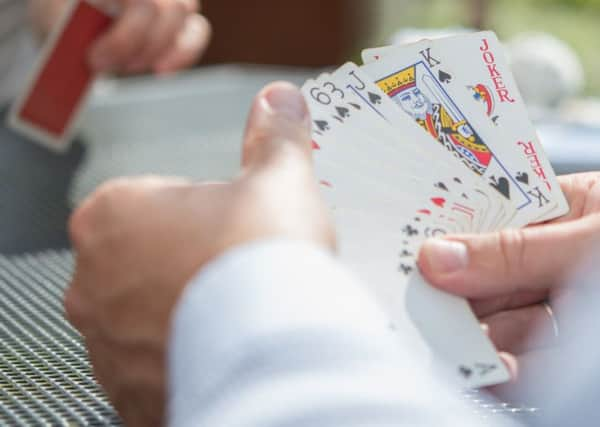Long history of town’s Whist League under threat due to diminishing numbers


Here league organiser David Moore writes about the long history of the league, how they plan to continue and appeals to any potential new players...
The Horsham and District Whist League started in 1898, when card playing games were essential family entertainment in the home.
Advertisement
Hide AdAdvertisement
Hide AdGenerations of children learnt to play a range of games, including whist, from a very young age and there was a steady flow of players coming through from each generation.
Little is known about the early days of the league in Horsham, though it would undoubtedly have been suspended for the duration of the First World War.
Based on the Winner’s Cup, which still exists, the league would appear to have restarted in 1921, when the winners that season were a Roffey team.
It’s obvious that the league continued to grow and the trophy was won by teams such as the Royal British Legion, the Royal Sussex Club and Carfax United.
Advertisement
Hide AdAdvertisement
Hide AdYou also see the growth of the league with the introduction of clubs such as Trinity A and Trinity B, which eventually led to the creation of two divisions. There’s little doubt that the heyday of the Whist League was in the period between the two wars.
The Second World War brought things to an abrupt halt and the league was suspended from 1940 to 1948. Even when play recommenced and Roffey won the trophy for the next four years, there is little doubt that interest in the game started to decline after WW2.
By the early 1950s, ten teams remained in operation, although each team was comprised of seven pairs, a total of 140 players.
Games were played in a variety of venues. Pubs dominated proceedings, as you might expect, with games being played in the Bell, the Bedford, the Queens Head, the Shelley Arms and the Star
Advertisement
Hide AdAdvertisement
Hide AdIf you wanted to suffer for your love of cards, the place to go was the unheated hut in the recreation ground at the end of Victory Road.
Then there were some of the more interesting venues such as the Roffey Institute, Forest Hospital and the army barracks at Broadbridge Heath. The Army barracks is long gone, though some of our older members will know that the Tesco superstore and the Broadbridge Heath Leisure Centre stand on what was part of the camp.
Roffey Institute is still there. Forest Hospital, originally built as a workhouse in 1838 – 1839, was used to treat military casualties during the Second World War and, from 1948, provided care for people with severe learning difficulties. Around 1990, the site was redeveloped, the outbuildings were demolished and the main building was converted for residential accommodation.
By 2008, the number of teams had fallen to four and only two venues remained in use. As the number of players continued to diminish, the team size had to be reduced but the Whist League continued. Unfortunately, a critical level was reached in January 2019 and it became impossible for the league to continue in its current format after 120 years.
Advertisement
Hide AdAdvertisement
Hide AdUnfortunately, the days of card playing in general and whist in particular are disappearing as things such as television and computers attract people’s attention.
Even the halcyon days of the whist drive are long gone and the sight of the Drill Hall in Denne Road, packed with a multitude of whist players, is yesterday’s dream as are the regular whist drives that used to take place in the village halls in and around Horsham.
That doesn’t mean that whist is a dead card game and the remaining players in the league intend to continue to enjoy the game as a pairs competition. In the meantime, if more players can be found, it will be possible to review the future.
With that in mind, if anyone is interested in playing whist on a Tuesday evening from September to April of each year, contact myself on 01403 261640 and find out more about a leisure activity, which might suit you.